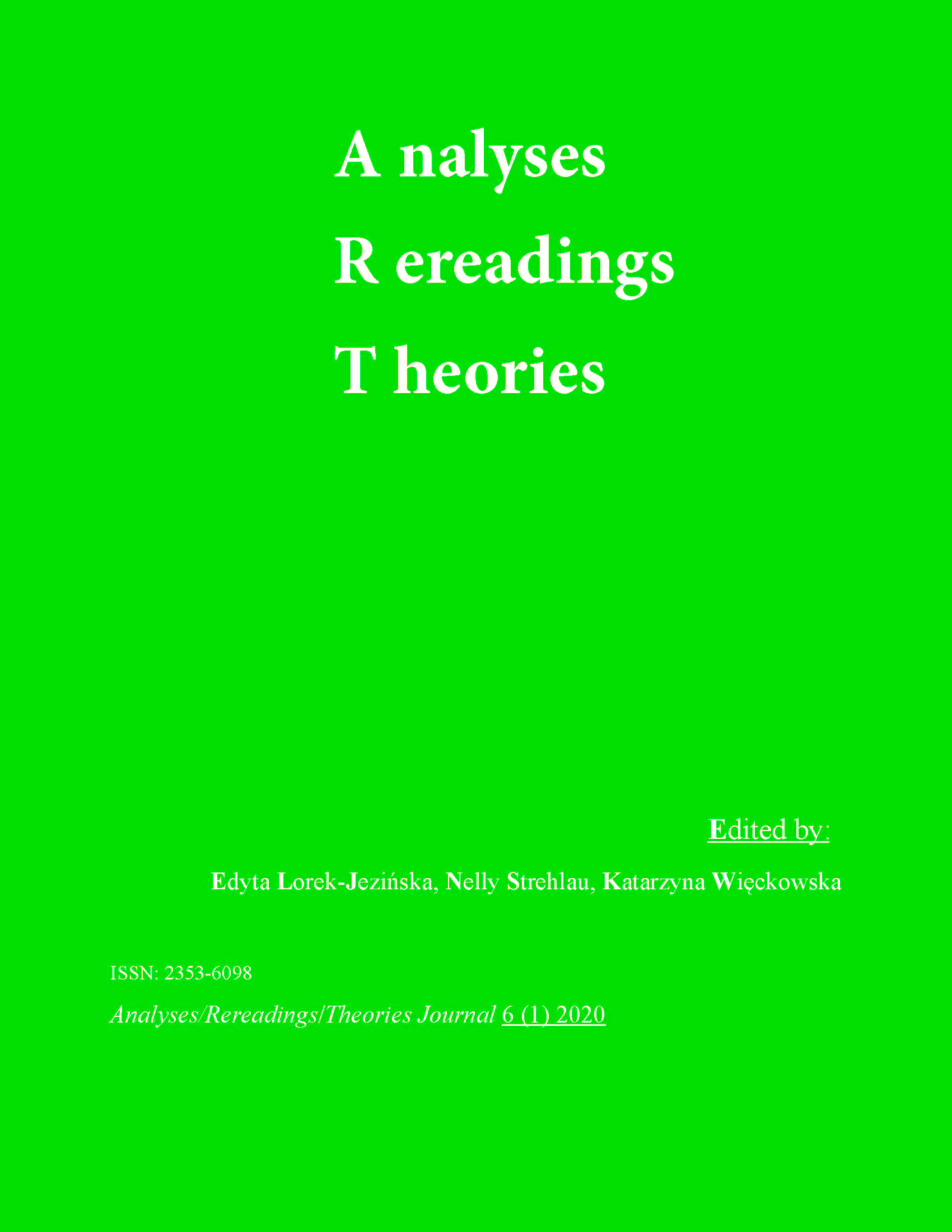Supernatural Beings and Their Appropriation of Knowledge and Power in The Seafarer by Conor McPherson and Woman and Scarecrow by Marina Carr
DOI:
https://doi.org/10.18778/2353-6098.6.05Keywords:
Carr, Marina, McPherson, Conor, supernatural, knowledge, manipulation, appropriation, The Seafarer, Woman and ScarecrowAbstract
This article is a comparative analysis of Woman and Scarecrow by Marina Carr and The Seafarer by Conor McPherson from a hauntological perspective. It aims at discussing the influence of supernatural beings on mortal protagonists as well as addressing the configurations of power and knowledge formed between the characters. Woman and Scarecrow follows the final moments of a dying woman accompanied by the mysterious figure of Scarecrow, who is hidden from other characters. The verbal exchanges between Scarecrow and Woman will be interpreted as a manifestation of the apparent power possessed by the former, the ambiguous supernatural figure, over the latter, a human being, in terms of appropriating the knowledge about the woman’s past. In McPherson’s The Seafarer, a mysterious relationship develops between Sharky and Mr. Lockhart, who knows about Sharky’s past, too. This paper will demonstrate both similarities and differences in the way in which Carr and McPherson make use of supernatural beings that manipulate human characters in the most crucial moments of their lives and will situate the two plays within the recent rise of interest in spectrality in Irish drama.
References
Carr, Marina. 2009. Woman and Scarecrow. Plays 2. London: Faber & Faber.
Google Scholar
Davis, Colin. 2005. “État Présent: Hauntology, Spectres and Phantoms.” French Studies, Vol. LIX, No. 3, 373–79. https://doi.org/10.1093/fs/kni143
Google Scholar
DOI: https://doi.org/10.1093/fs/kni143
Derrida, Jacques. 1994. Specters of Marx: The State of the Debt, the Work of Mourning and the New International. Transl. Peggy Kamuf. New York and London: Routledge.
Google Scholar
Gordon, David. 2018. “Death Becomes Her in Woman and Scarecrow.” TheaterMania, 20 May 2018. https://www.theatermania.com/off-broadway/reviews/review-woman-and-scarecrow_85271.html DOA: 4.03.2021.
Google Scholar
Hill, Shonagh. 2019. Women and Embodied Mythmaking in Irish Theatre. Cambridge: Cambridge University Press. https://doi.org/10.1017/9781108756327
Google Scholar
DOI: https://doi.org/10.1017/9781108756327
Jordan, Eamonn. 2019. The Theatre and Films of Conor McPherson: Conspicuous Communities. London and New York: Methuen Drama, Bloomsbury Publishing Plc.
Google Scholar
Lonergan, Patrick. 2011. “Irish Theatre and Globalisation: A Faustian Pact?” In: Eamon Maher (ed.). Cultural Perspectives on Globalisation and Ireland. Frankfurt am Main: Peter Lang, 177–90.
Google Scholar
Lorek-Jezińska, Edyta. 2013. Hauntology and Intertextuality in Contemporary British Drama by Women Playwrights. Toruń: Nicolaus Copernicus University Press.
Google Scholar
McPherson, Conor. 2007. The Seafarer. New York: Theatre Communications Group. https://doi.org/10.5040/9781784600341.00000004
Google Scholar
DOI: https://doi.org/10.5040/9781784600341.00000004
Miller, Deb. 2018. Review: ‘Woman and Scarecrow’ at Irish Repertory Theatre. DC Metro, 20 May. https://dcmetrotheaterarts.com/2018/05/20/review-woman-and-scarecrow-at-irish-repertory-theatre/ DOA: 18.03.2021.
Google Scholar
Morash, Christopher. 2004. A History of Irish Theatre, 1601–2000. Cambridge: Cambridge University Press.
Google Scholar
Morash, Christopher and Shaun Richards. 2013. Mapping Irish Theatre: Theories of Space and Place. Cambridge: Cambridge University Press. https://doi.org/10.1017/CBO9781139600309
Google Scholar
DOI: https://doi.org/10.1017/CBO9781139600309
Murray, Christopher. 2000. Twentieth-Century Irish Drama: Mirror up to Nation. Syracuse, New York: Syracuse University Press.
Google Scholar
Sihra, Melissa. 2018. Marina Carr: Pastures of the Unknown. Cham: Springer. https://doi.org/10.1007/978-3-319-98331-8
Google Scholar
DOI: https://doi.org/10.1007/978-3-319-98331-8
Singleton, Brian. 2004. “The Revival Revisited.” In: Shaun Richards (ed.). The Cambridge Companion to Twentieth-Century Irish Drama. Cambridge: Cambridge University Press, 258–70. https://doi.org/10.1017/CCOL0521804000.019
Google Scholar
DOI: https://doi.org/10.1017/CCOL0521804000.019
Trench, Rhona. 2010. Bloody Living: The Loss of Selfhood in the Plays of Marina Carr. Frankfurt am Main: Peter Lang.
Google Scholar
Watt, Stephen. 2000. “Love and Death: A Reconsideration of Behan and Genet.” In: Stephen Watt, Eileen Morgan, Shakir Mustafa (eds). A Century of Irish Drama: Widening the Stage. Bloomington, Indiana: Indiana University Press, 130–45.
Google Scholar
White, Eva Roa. 2018. “Whose Dublin Is It Anyway? Joyce, Doyle and the City.” In: Maria Beville and Deirdre Flynn (eds). Irish Urban Fictions. Cham: Palgrave Macmillan, 23–44. https://doi.org/10.1007/978-3-319-98322-6_2
Google Scholar
DOI: https://doi.org/10.1007/978-3-319-98322-6_2
Downloads
Published
How to Cite
Issue
Section
License

This work is licensed under a Creative Commons Attribution-NonCommercial-NoDerivatives 4.0 International License.









